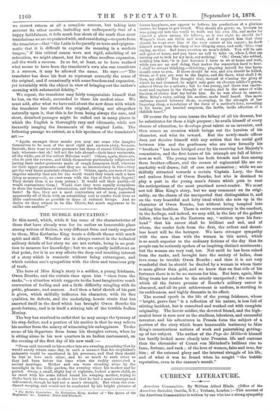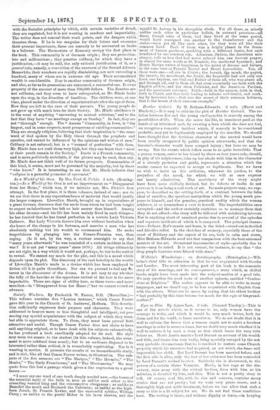CURRENT LITERATURE.
American Communities. By William Alfred Hinds. (Office of the American Socialist, Oneida, N.Y.; Triibner, London.)—This account of the American Communities is written by one who has a strong sympathy with the Socialist principles by which, with certain varieties of detail, they are regulated, but it is not wanting in candour and impartiality. The writer does not conceal their weak points, and the dangers which threaten them. If he is too sanguine for their future and overrates their present importance, these are scarcely to be accounted as faults in a believer. The Harmonists of Economy occupy the first place in the book. This community is of German origin ; they are protection- ists and millenarians ; they practise celibacy, for which they have a justification,—it may be said, the only rational justification of it, as a general rule, namely, a conviction of the nearness of the Second Advent. Meanwhile, their numbers are rapidly diminishing, not now exceeding a hundred, many of whom are in extreme old age. Their accumulated wealth is considerable. Zoar is another community of German origin, and also, as far as its possessions are concerned, a successful one. It owns
property of the amount of more than 700,000 dollars. The Zoarites are not celibates, and they seem to have retrograded, as Mr. Hinds looks upon the step, in the direction of familism. The children were, at one
time, placed under the direction of superintendents after the age of three. Now they are left to the care of their parents. The young people do
not grow up with much love for their Society. Mr. Hinds attributes it to the want of anything "answering to mutual criticism," and to the fact that they have "no meetings except on Sunday." In fact, they are
not "thorough" enough. The" Amana " Community, in Iowa, is "the largest, and in some respects, most prosperous of existing communities." They are strongly religious, believing that their inspiration is "the same word of God spoken by the Holy Ghost through the prophets and apostles, and cannot be influenced by the opinions and wishes of men." Celibacy is not enforced, but is a "counsel of perfection " with them. Mr. Hinds does not rank them very high, but they can boast that " most of their youth remain in the Society." 'eerie is a French community, and is more politically socialistic, if the phrase may be used, than any. Mr. Hinds does not think well of its future prospects. Communities of this kind, it seems, must not be governed by the majority, but by those "who know." It is interesting to see that Mr. Hinds believes that "religion is a powerful promoter of agreement."































 Previous page
Previous page